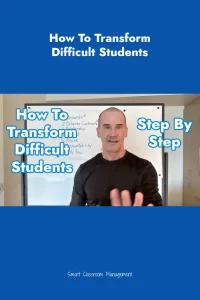Smart Classroom Management now has a YouTube channel. Our plan is to post long-form videos that cover the core principles of effective classroom management.
Think of it as a classroom management school to take you from novice to expert.
Our new video is called How To Transform Difficult Students. It’s available to watch right now.
The steps/sections covered include:
- Rewards
- Behavior Contracts
- Relationships
- Pretending
- Praise
- Accountability
- Only You
- Time
- Checking In
- Pulling Aside
When you’re finished watching the video, you’ll know exactly what to do to transform your most challenging students into well-behaved members of your classroom.
Please do me a favor and subscribe to the channel. Also, hit the thumbs up button, leave a comment, and/or share it with your friends and colleagues.
Please note that the videos posted to our YouTube channel will be original. In other words, you won’t find them on our Facebook page—which will continue to have its own original content.
If you haven’t done so already, please join us. It’s free! Click here and begin receiving classroom management articles like this one in your email box every week.


That’s great, Michael! I’ve seen your videos on Facebook before, and often wish they were on YouTube. Good luck with your new channel!
Thanks Rowan! We’re giving it a shot.
I subscribed SO fast! Thank you Michael! Now if only I could see you actually teaching… Without students’ faces of course!
Thanks Bonnie!
Michael, I probably won’t watch a video. I like to read your advice! Can you possibly provide both?
Hi Julie,
We will continue to post articles here every week same as always.
I’d love to have the video. I do experience students with difficult behaviors.
It seems like it all comes down to the classroom management plan, but if we’re not supposed to send students to the office, then what’s the end stop of the management plan? And how do we initially stop the distracting behavior without removing students from the classroom? What I’m seeing right now is a handful of very rowdy students whose energy is affecting the entire classroom. What is supposed to stop the rowdiness? I’ve read your upper middle and high school plans, but I don’t understand how they work if a) a student doesn’t care about their grades, or b) a school’s systems don’t allow a teacher to make a large portion of the grade based on classroom participation as suggested. For example, at my middle school, I’m expected to be consistent with the other teachers in how I do my grading — I agree with the importance of this consistency (for fairness for the students), but it doesn’t give me a lot of room to experiment with your suggested plan. Also, again, what if a student just doesn’t care if they get a poor grade? Many of these students have a lifetime of bad grades and expect nothing less. And, certainly, I can prepare excellent lessons all day long, but if my students interrupt every minute, then how am I supposed to even “hook” them into my lesson?
All this to say, I’ve been reading your blog and books for years and I still don’t really get it. Mostly my students see me as a softie because I don’t send them to the office. Yesterday a student told me I’m “all bark and no bite.” Without sending students to the office, they don’t take me seriously.
One thing that might be useful someday is if you included more real life stories from other teachers of how they implemented your theories in their specific schools and classrooms. The theories sound really great, and certainly there are often positive comments on here and positive reviews on the books, but it’s still not clicking for me in real life.
l love this video. Good job. As College Instructor the theories sound great.
Great video!…covers the important aspects, especially the accountability. I believe totally in strong, effective classroom management. But…as a sub in several different school districts —including as a long-term sub—I have seen that the whole thing goes down the drain if the regular teacher and the admin are weak and do not support the teacher or the sub. And I have noticed that some (many?…most?) teachers ARE strong but that they are reluctant to implement such a classroom management plan because they figure “why bother” because they’ve tried it and they know that the wishy-washy admin won’t support them.
Thank you for doing this!!!!